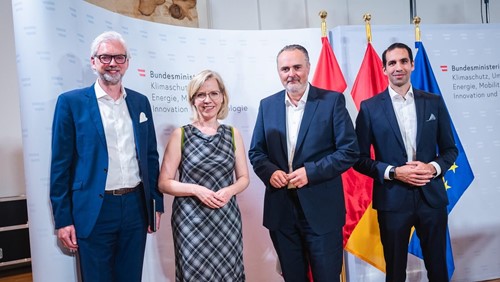News
Large-volume electrolysis plant to be built in Burgenland
Burgenland Energie and VERBUND start cooperation for independence from international providers and fossil energy sources.

The largest electrolyzer in Austria to date will be built in Burgenland. When fully expanded, 40,000 tons of green H2 will be produced from 300 MW of wind and solar energy. This makes the project – initiated by Burgenland Energie together with VERBUND and partners – one of the largest H2 projects, even in a European comparison. In a joint press conference, Climate Protection Minister Leonore Gewessler, Governor Hans Peter Doskozil, VERBUND CEO Michael Strugl and Burgendland Energie CEO Stephan Sharma presented the joint plans. Green H2 is an important step towards energy independence and climate neutrality, as is unanimously emphasized.
Green H2 is an important building block on the way to climate neutrality
The high-quality energy carrier can be used in many ways and enables decarbonization, especially in industry, where fossil fuels often cannot be directly replaced by electricity. It can also play a role in storage in the future, as well as in niche mobility applications.
“We are currently feeling quite clearly how dangerous our dependence on energy imports is. That is why we will increasingly rely on domestic production for green hydrogen. Just a few weeks ago we laid the foundation with our hydrogen strategy. Today we can already present a first project. This is an important and big step," said Minister Gewessler. The joint initiative of the two domestic energy companies is an important building block in the federal hydrogen strategy and an excellent signal. “The federal government can create framework conditions, but these must be used locally. I am very happy that committed pioneers have been found here in Burgenland, Burgenland Energie and VERBUND.”
Burgenland as a pioneer in renewable energy
Provincial Governor Hans Peter Doskozil referred to the history of Burgenland, from which a special claim for the future can be derived: “Burgenland was already a pioneer in the 1990s when it came to renewable energy. Due to a lack of fossil energy sources, the first wind turbines were installed in Austria at that time. Today we are also relying on the massive expansion of photovoltaics. Our ambitious goal is to become climate-neutral by 2030, i.e. in eight years’ time.” Achieving this ambitious goal requires a joint effort from everyone involved, an acceleration of the processes and the courage to do pioneering work.
“We have to make full use of the potential offered by solar and wind power. This includes the possibility of producing green hydrogen. Verbund is an important partner here. When fully expanded, the plant can cover more than ten percent of the republic's total gas requirements without any CO2 emissions," said the governor. This protects the climate but is also an important step towards the necessary independence from gas from Russia. "Our goal is not only to be climate-neutral by 2030, but also to be energy self-sufficient, i.e., to cover all energy requirements from our own sources. This will also make it possible in the longer term to determine the price of energy yourself.”
Green H2 as a game changer
As a pioneer in green hydrogen, VERBUND, together with voestalpine and Siemens, put Austria's first PEM electrolyzer into operation back in 2019. Green hydrogen is an essential pillar of the corporate strategy. VERBUND CEO Michael Strugl: “Europe is facing a turning point in the energy industry. Renewable energies are our only chance for decarbonization and independence from fossil imports - but we also need green hydrogen as a game changer."
By 2040, the demand for green H2 in Austria will be 4 to 5 times the current total demand. This demand will be met by increasing local production, but also by H2 imports. Michael Strugl: “Now is the chance to put Austria in a pioneering role. This joint project takes us a big step towards the future of energy.”
Stephan Sharma, initiator and idea generator of the project, states: “Hydrogen is a crucial energy carrier of the future. Today we are in the greatest energy transformation since the invention of the steam engine. In a very short time, we will switch heating and mobility from fossil fuels to electricity. And that's good and right. Instead of burning fossil raw materials, we can produce electricity with renewable energies and use it for our needs. For those gaps where electricity is not an adequate substitute, cleanly generated hydrogen is an excellent product to replace oil and gas.”
European milestone on the way to the energy transition
The plant, which Burgenland Energie and VERBUND are building together in Burgenland, will be built in several stages: "From 2026 we will produce 9,000 tons of green hydrogen from Burgenland wind and solar energy per year. In the full expansion stage by 2030, there will be 40,000 tons of hydrogen per year for Austria, which will save us 400,000 tons of CO2 emissions annually." explains Sharma and underlines that this is the next highly innovative project in Burgenland on the way to energy independence act. “As a green technology company, we are already leaders in electricity production from wind and solar energy in Austria. With this innovation project, we are refining wind and solar power from Burgenland into hydrogen for Austria.”
To be able to use this size of the innovative project in a correspondingly qualitative way, it is important to enter into competent support through substantive partnerships. "Together with VERBUND as a partner and with the support of the federal and state governments, we are creating a project in Burgenland that sets a European milestone on the way to the energy transition in this dimension," concludes Sharma.

